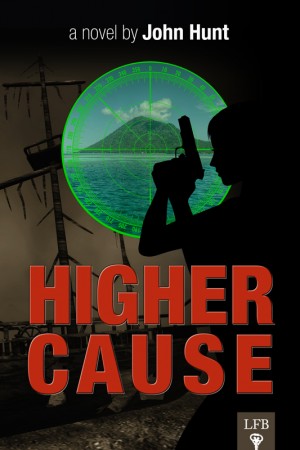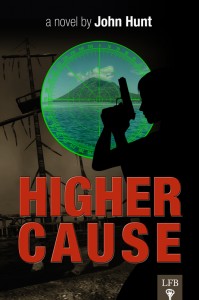This review is part of a series covering each installment of the serialized novel Higher Cause, written by John Hunt and published by Laissez Faire Books. To catch up, start with the announcement, the book’s link-rich table of contents, and the first review.

Higher Cause is a bit of a mixed bag this week. The final showdown continues, but there is an aspect to it that fails to convince. The action and the tension remain, but some of the maneuvering with respect to international law does not strike this reader as very plausible. However, there are two very good moments, one of them being what is probably the novel’s greatest cliffhanger.
The standoff with Mexico reaches what seems like a climax, only to redouble in suspense just a short while later. All in all, this final showdown has been an up-and-down affair. Just when the reader thinks one faction has an advantage, the tables get turned. I expect they will turn again, though how this is going to happen after the aforementioned cliffhanger is beyond me.
There have been a number of things I have criticized in these reviews, all having to do with how information is conveyed to the reader. There has been tell when there should be show. There have been moments when something already understood is explained at length. Sometimes, things that we do not need to know yet, or even really should not know yet, are told to us. All three kinds of these “information problems” are on display in this installment.
SPOILER SPOILER SPOILER
Let us consider the following paragraph.
They had the man on the defensive now. Less than an hour ago, Marcos was informing Petur that he was being indicted — threatening him with prison and death and takeover of the islands. Now he had lost his ship, and along with it his biggest threat. He had learned that his operation had been infiltrated by a spy from the Island — a woman of whom he had been particularly fond. And he had discovered that his effort to expel the islanders might not be supported by the law. Furthermore, he had seen that the Island Project had a new, incredibly powerful weapon. Indeed, the man was on edge.
The very first sentence tells us something when a more compelling choice would have been to show us. This could be done by describing his body language, or facial expression, or simply by giving him dialogue appropriate to his mental state. It is not a mortal sin for a novelist to commit, but it is a lost opportunity.
What follows that sentence, however, is entirely redundant and really ought to be omitted. We have already spent time reading these things; a summary is simply wasting time.
END OF SPOILER
Finally, we are given extra information that often comes from a writer with an itchy trigger finger. For instance, if something happens, say, to a ship in the distance, the present characters will only be able to tell so much about what happened to the ship, what condition it is in now and what exactly was the final result of the occurrence, what it may be. This is a good thing. It leaves the reader in the same sort of doubt in which the characters find themselves, and ignorance, if well chosen, can enhance a reading experience.
Too often in Higher Cause we read, after some momentous act has occurred, sentences that begin, “It would later turn out that…” or something like that. It is my opinion that this information, if it is important, can be learned later, when the characters learn it. Knowing too much can spoil a mood. An author ought to leave a few loose ends that he can tie up later. Giving us that omniscient information seems impatient, like the author wants the readers to know something and wants to get that information conveyed now, so he can cross the item off his agenda.
The penultimate installment comes in a few days. After such a cliffhanger as we just experienced, there will no doubt be some eager readers. I wonder if yet another cliffhanger awaits us before the wrap up.















